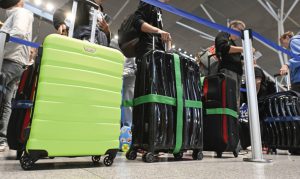BLOOMBERG
Europe’s long-awaited recovery in corporate travel keeps getting pushed back.
Since the end of the coronavirus pandemic, the region’s biggest airline groups have been counting on corporate warriors to head back to the skies. But so far, many business clients have sat out the travel rebound.
Just two years ago, Deutsche Lufthansa AG Chief Executive Officer Carsten Spohr boldly predicted a 90% rebound in corporate travel, saying people had grown tired of video conferencing. Yet Europe’s biggest airline group has so far recovered only about 60% of pre-Covid business volumes, and is targeting 70% by year-end.
British Airways is seeing similar trends. Luis Gallego, CEO of parent company IAG SA, says progress is happening “more slowly than we thought at the beginning of the year.”
Air France-KLM Chief Executive Officer Ben Smith said he doesn’t expect the French domestic market to ever fully recover. “We’re not going to get there,” he said.
The reasons are varied, but stacked together they form a wall of obstacles airlines haven’t been able to scale. It’s a major challenge because business fliers typically pay more even if they’re filling an economy seat — flying on shorter notice and choosing pricier tickets that afford them more flexibility.
That makes them more profitable customers than the leisure passengers who largely drove airlines’ comeback from Covid lows. And airlines are counting on business travellers’ return, as the “revenge-travel” boom that has powered the leisure segment is starting to waver.
In Germany, smaller companies that make up the heart of the manufacturing base are back on the road but major players have pulled back in ways that appear to be structural.
Zurich Insurance Group AG, a company headquartered in one of the Lufthansa group’s hub cities, has said it wants to keep its staff’s flying 70% below pre-pandemic levels as part of its push to lower operational emissions.
During the crisis, large corporations gutted travel budgets to survive, and found out that the ease and efficiency of conferencing software made some trips unnecessary. Now, facing cost inflation and pressure to cut greenhouse gas emissions, they see no need to change course.
Although most airlines didn’t expect business travel to fully recover post-pandemic, they predicted it would bounce back to as much as 85%, said Neil Glynn, an analyst with Air Control Tower. Instead, corporate traffic is at around 60% in Germany, 70% in Japan and 80% at most in the US. This is partly because of a remote work culture, as well as carbon consciousness and more awareness for employee wellness, he said.
The concerns about business travel in Europe mirror weakness seen in the US, where American Airlines Group Inc and Southwest Airlines are among the carriers that have made changes to adapt to lower corporate demand. United Airlines Holdings Inc CEO Scott Kirby has described a “business recession” in the US, while expressing confidence in a comeback.
At IAG, CEO Gallego said corporate travel has bounced back more strongly at Spain’s Iberia than at BA, because Spanish workers are returning to the office sooner than those in the UK.
Dufry sees a “progressive return” of business travellers as well as a trend of shorter breaks boosting already strong leisure demand, CEO Xavier Rossinyol Espel said in an interview.
 The Gulf Time Newspaper One of the finest business newspapers in the UAE brought to you by our professional writers and editors.
The Gulf Time Newspaper One of the finest business newspapers in the UAE brought to you by our professional writers and editors.
